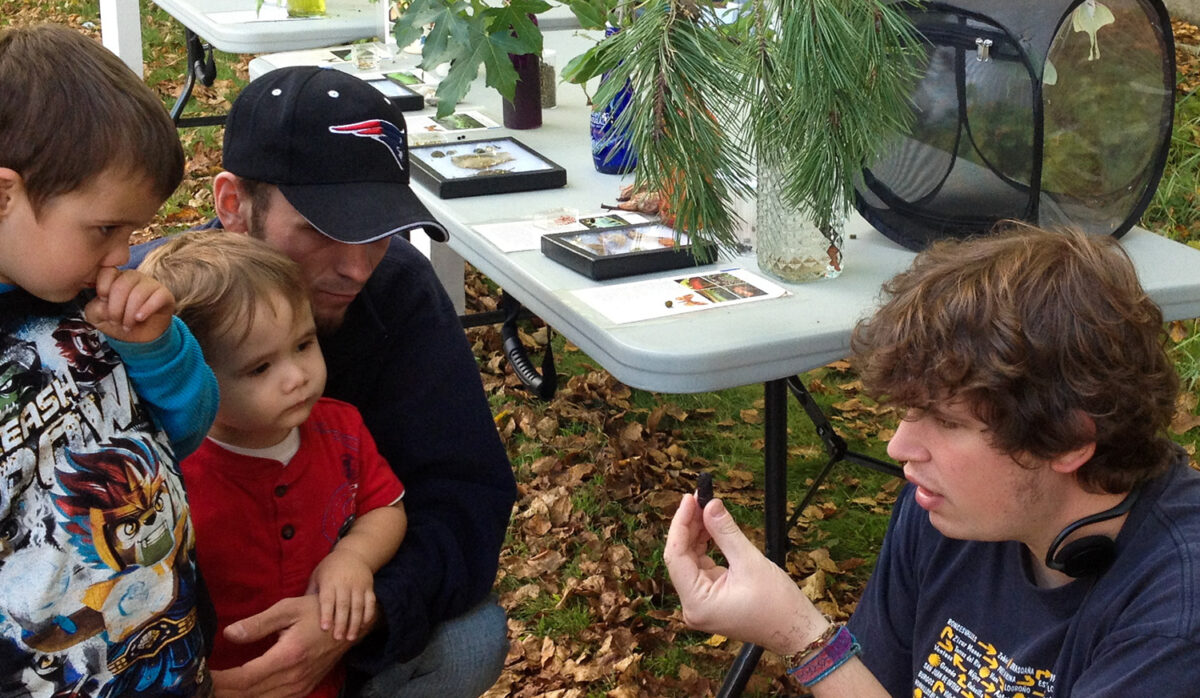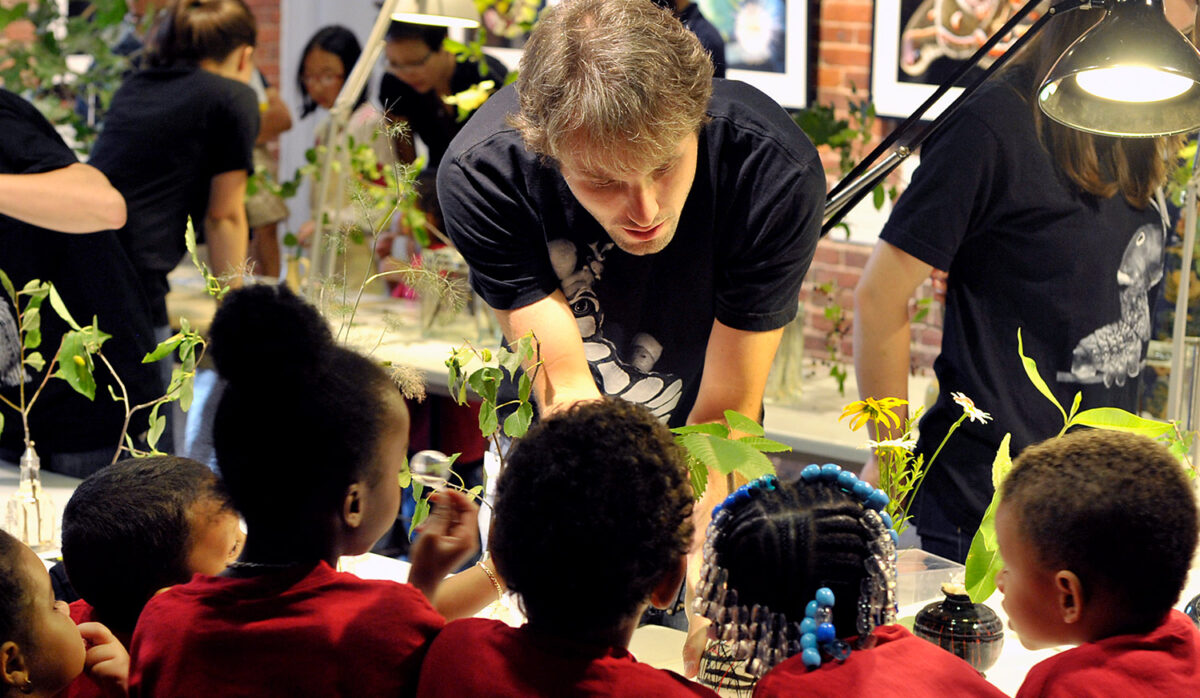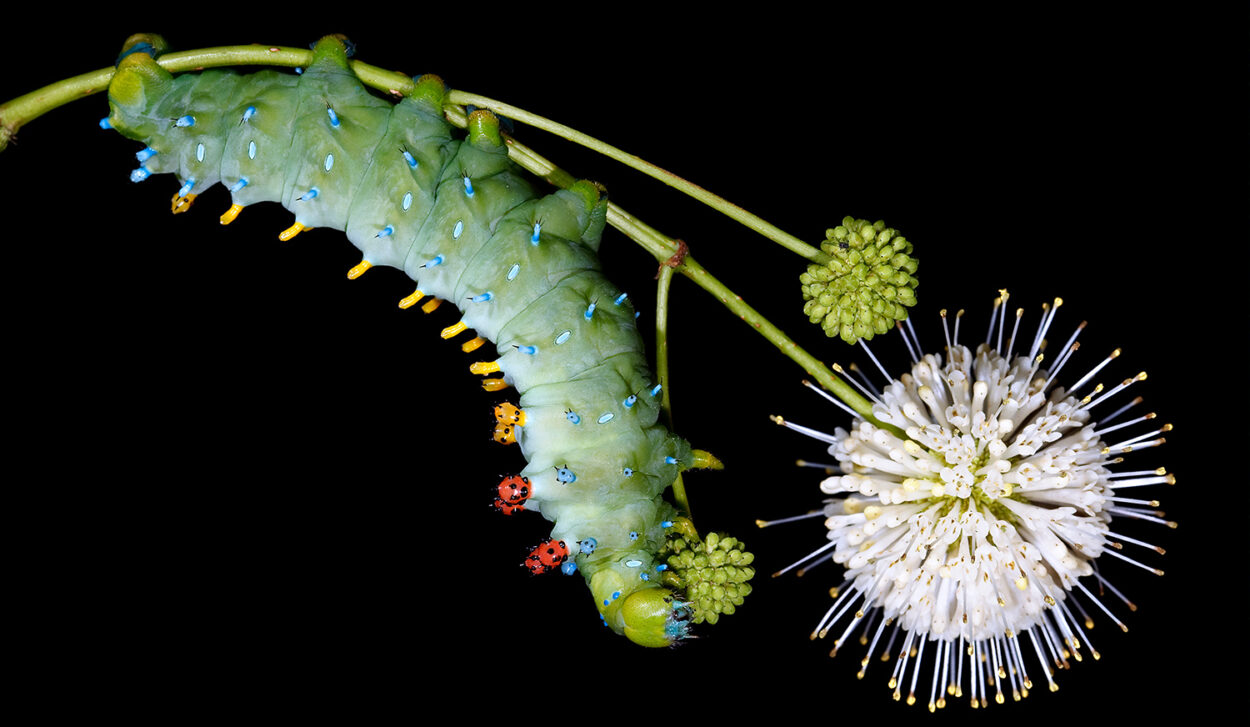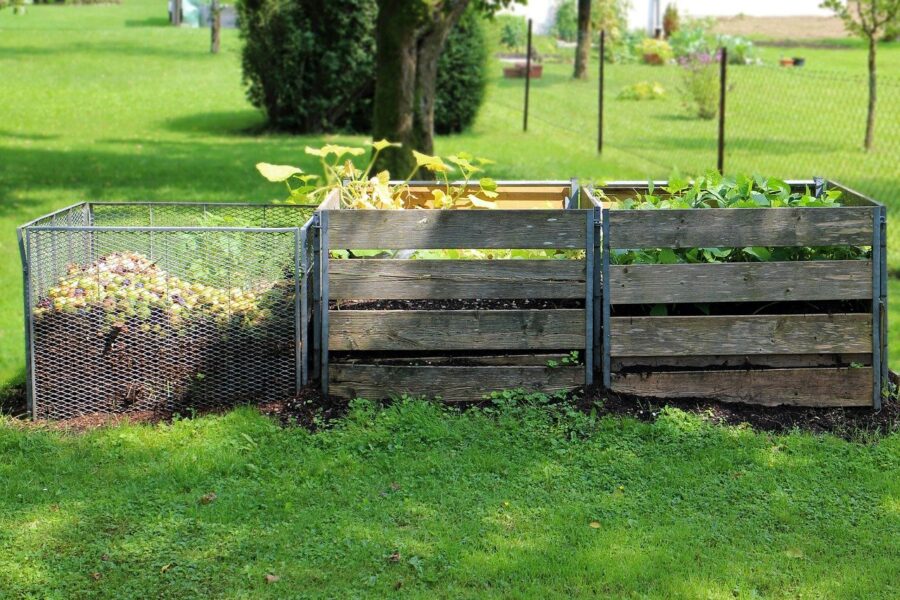In the summer of 2013, Sam Jaffe was hired by the BBC to raise a crop of caterpillars. Jaffe, at the time, was a student in Antioch’s MS in Environmental Studies, Environmental Education, and now he had a contract to raise hundreds of special, rare, and charismatic caterpillars for a late summer filming date of a new show that would eventually be called Earth’s Greatest Spectacles. Suddenly, he had only a few months to raise and care for the caterpillars. He convinced his fellow Environmental Studies students Jesse Varga and Monica Foley to join him in filling an apartment in downtown Keene with caterpillar larvae, habitats, and supplies to ensure a thriving caterpillar population. And they succeeded in bringing up a bumper crop of these photogenic larvae.
This was the very start of what is now the Caterpillar Lab, a Monadnock-region nonprofit dedicated to the appreciation of caterpillars by means of educational programs, research initiatives, and photography and film projects dedicated to capturing the “humor, mystery, and beauty” that Jaffe sees in caterpillars. Over a decade after that summer, they’re still raising caterpillars at the Caterpillar Lab, which is currently located in Marlborough, NH. Though without a doubt they make great TV stars, as well, today the insects mostly serve educational and scientific purposes. The Caterpillar Lab is regularly open for visitors and school trips, and the folks behind it also take their special larvae on the road all around New England, visiting festivals, schools, and museums.
For Jaffe, the work is a continuation of a lifelong love of these diverse, wonderful creatures. “I’ve been rearing caterpillars since a very young age and was already completely enthralled with them and knew their stories and their charisma and things that people wouldn’t associate with them, you know, being weird little characters,” he says. Now he gets to share his love of caterpillars with people of all ages. As he explains, “They have this ability to attract attention and excitement from people who didn’t necessarily know or care about them beforehand. They have amazing defenses and surprises, inflatable horns or big attitudes and gnashing jaws, or they might spray acid or have false eye spots. So there’s a lot of surprising stories wrapped up in them that we get to explore.”
From Humble Experiment to Long-Running Nonprofit
Varga remembers that first summer clearly. “Sam was in the position of having to raise an entire summer’s worth of caterpillars for, like, a week and a half of filming. And he said, ‘Well, why not try to do something with that?’” He continues, “We didn’t really know it was going to last beyond one summer. But then the next summer was like, ‘Oh, it seems like people like these caterpillar programs. Let’s try it again. Let’s talk to Antioch and get our first intern.’ And then suddenly it was the next summer and then the next…”
Varga is now the Facilities, Store, and Donations Manager for the Caterpillar Lab, and he also does educational programming when time allows. Meanwhile, the third founding member, Foley, no longer works for the Caterpillar Lab—she went on to obtain her teacher licensure and now works as a biology teacher at Keene High School.

Jaffe and Varga have continued to explore just how far the Caterpillar Lab, with its mission to educate and bolster public appreciation for caterpillars, could go. The Lab has occupied multiple spaces throughout the Monadnock region, from the summer apartment in downtown Keene to the former Colony Mill Marketplace just down the road from Antioch’s New England campus. Today, the Caterpillar Lab is located on Main Street of Marlborough, New Hampshire. The current version of the Lab raises over 600 native species of caterpillars each year, all of which are cared for by a year-round team of just five employees.
While overseeing the organization’s management and day-to-day operations, Jaffe and Varga still maintain an active role in what the workers at the Lab call “wrangling” the caterpillars: the daily tasks of feeding, watering, and maintaining the habitats of each individual insect. Beyond this, both continue to work alongside permanent and seasonal staff with educational programming as much as possible. This includes hosting open hours for the public to visit, school trips for K-12 students, and research opportunities and internships for undergraduate and graduate students. The Caterpillar Lab has also traveled near and far, presenting caterpillars to the public at the Keene Farmers Market and making many, many visits to schools, universities, and research initiatives across New England and, sometimes, beyond. (For instance, they participate yearly in Mothapalooza, a mothing weekend in Ohio.)
While many of the educational programs are well-attended by children, Jaffe is quick to explain that the Lab is also meant to be experienced by those across the whole lifespan. “We love kids and families, and we do school programs, but we are also helping with graduate courses and educating adults of all forms,” he says. “Everyone just really gravitates towards this. I like a room full of adult photographers and naturalists and scientists combined with third graders and families and grandparents. I think it’s healthier to have it all together when possible.”
A Project With an Antiochian Throughline
Through all the work of the Caterpillar Lab, the connection to community remains a constant—and one of the weaves of the project is its connection to Antioch.
For Varga, it was his love of nature that led him to Antioch—and from there to the Caterpillar Lab. He first heard about Antioch when, as a college graduate, he began working at a nature-based camp in Ohio. The camp itself was affiliated with Antioch University via its original campus in Yellow Springs—and Varga’s supervisor recommended that he investigate the degrees offered by the Environmental Studies department on the New England Campus. “My boss at the time was like, ‘Hey, if you’re thinking about grad school, check out New England.’” Within the year, he would meet Jaffe and the two would begin their summer project of raising caterpillars together.

As for Jaffe, the decision to attend Antioch was one rooted in community and passion. “I wanted to try to find the community of people who are engaging in similar things,” he says. “That’s really what Antioch provided most for me was just other people who were excited and wanted to join in and spend summers doing this and grow the idea.”
And that dedication to the community continues to be present at the New England campus today. Abi Abrash Walton, chair of the Environmental Studies department, describes just how important Jaffe’s contributions are to Antioch and the wider Monadnock region. “Sam Jaffe has strengthened and sustained his passion and expertise for caterpillars across decades, including during his graduate studies here at Antioch,” says Abrash Walton. “His contributions to raising awareness about caterpillars endemic to the Northeast cannot be underestimated.”
From Lab to Book—and Beyond
The excitement for caterpillars is sustaining, and it extends beyond the Caterpillar Lab itself. Jaffe has been working on a scholarly book of caterpillar, butterfly, and moth histories for over six years. Cornell University Press has the book on contract, and though some of the details are still in the works—it is, in Jaffe’s words, “such a huge project”—it is clear it will be an important contribution to science. Reflecting as it does Jaffe’s deep appreciation of caterpillars, the book project has been growing and growing. “The project which is now looking like maybe four books each, about 1000 pages,” he says. “It’s a little insane.”
Jaffe is also an accomplished photographer. In fact, many of his caterpillar prints hang on Antioch’s New England’s campus. Abrash Walton, the Chair of the Environmental Studies Department, says that she’s proud that the program has a collection of prints of Jaffe’s photography. As she says, “The Antioch New England campus acquired a selection of Sam’s stellar photos more than a decade ago, and I am delighted to see one of them, featuring beautiful and creative caddis fly cases, every time I go into my campus office.”
Today, Jaffe’s photography work is more focused on his forthcoming book. As he says, “I’m spending hours taking pictures, sorting through them, creating image plates, and working on this book.”
Even as Jaffe works on the book, the Caterpillar Lab continues to welcome scientists, researchers, and students. The Lab has long standing research connections with both the University of Connecticut and Harvard University. They have also welcomed a number of graduate students, including a PhD candidate during the COVID-19 pandemic, who went on to publish a research article on ash-eating caterpillars and the continued mysteries surrounding their digestion process.
A Project Reliant on Community Support
Amidst the exciting and all-encompassing array of programs and initiatives the Caterpillar Lab offers, Jaffe stresses that the mission remains consistent. “Mission-wise, I want people to know about not just the lab, but the creatures themselves, and how we’re just surrounded by these amazing, native insects that are so valuable,” he says. He always hopes for more people to know about and take advantage of the lab’s educational programming—and to see the Caterpillar Lab as a place to learn more about the natural world. “ We’re a tremendous resource,” he says. “We’re out there educating, but we also raise all these caterpillars. And people walk in the door, and they can’t believe all the things that we have to see and offer.”
With this in mind, Jaffe also wants to stress how the Caterpillar Lab’s mission and continued growth require continued support from the community. Despite all of their success over the last decade, Jaffe says that “We’re just at a crossroads.” As he explains, “We don’t fit in our building anymore. We’ve got this great staff, but we’re all squeezed together. And all these big ideas that we make happen, we make happen with limited resources. It’s important to have the people who value us know that we’re trying to build and grow up—and we always need support to do that.”
The Caterpillar Lab is located on 172 Main Street in Marlborough, NH. Open hours are weekly from 12-5pm on Fridays and Saturdays. For more information on events and programming, visit: thecaterpillarlab.org/programs






